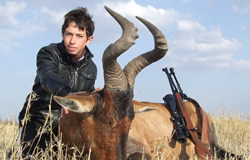


| Name | Red Hartebeest |
| Scientific Name | Alcelaphus bucelaphus |
| Average Weight Male | 150 kg |
| Average Weight Female | 120 kg |
| Shoulder Height Male | 1.25m |
| Shoulder Height Female | 1.15m |
| Mating Season | March / April |

Sometimes nicknamed the “Harley Davidson” of the antelope tribe,
because of the configuration of his horns, this “beest” is truly a strange looking creature. The elongated appearance of the face is exaggerated by the smooth unringed section
of the horns, which continues on the same line as the face. The horn then curves slightly forward and finally takes a drastic curve rearward coming to the tips. Both sexes carry these very
unique horns however the Bull's are much heavier, especially at the bases. The “beest's” white rump is very evident as he flees the scene when disturbed. The rocking horse
motion is almost comical when exaggerated by the up and down bobbing of his long face when the hartebeest takes flight.
When hunting the red hartebeest be patient; he is highly
inquisitive and even after set in motion the herd will often pause to mill around and survey the situation. His fatal mistake – take the shot. The Hartebeest has a strong
herd instinct, forming herds of 20 or so but herds numbering in the hundreds are not uncommon. The bulls are extremely territorial and will defend their turf against all comers at all cost.
In the absence of a herd bull, leadership of the herd will be passed temporarily to one of the adult cows. Commonly found in the arid savanna, the hartebeest prefers the open plains, while he
may be found in the sparse bush country, he avoids the dense bushveld. Primarily a grazer, he is partial to “red grass” and will sometimes browse on leaves. He drinks when
water is available. Hunting Red Hartebeest is best accomplished by first glassing from the high ground. He is relatively easy to locate in open country. Set up an ambush near the
approaches to a shady resting place, as he is apt to retreat there during the hottest parts of the day.Consider checking salt flats or mineral licks when hunting Red Hartebeest. Plan your stalks
at first or last light when the “beest” is most active.
Hunting Red Hartebeest will demand a good flat-shooting rifle. The .270 Win and a quality 130-grain expanding
bullet should be considered the minimum. The 7mm and 140 grain bullet with a good ballistic coefficient (aerodynamic bullet) is probably a better choice for hunting Red Hartebeest. That
brings us to the 30 calibers and if sighted-in properly the .308 Win, 30-06, but especially the 300 Mags with good 165 -180 grain bullets come into their own. Be cautious of those
“humped withers” when hunting Red Hartebeest as they have caused more that one experienced hunter to shoot too high! With a side-on presentation, aim directly up the rear
line of the front leg, never more that midway into the body. The neck of this unique antelope is a bit too slender to recommend that shot. If presented with a frontal shot when hunting
the Red Hartebeest, place it directly between the shoulder joints, but take the shot only if he lifts his head or turns it to the side. Hunting Red Hartebeest can net you a very unique trophy
and provide you with an interesting conversation piece once he is hanging on the wall.